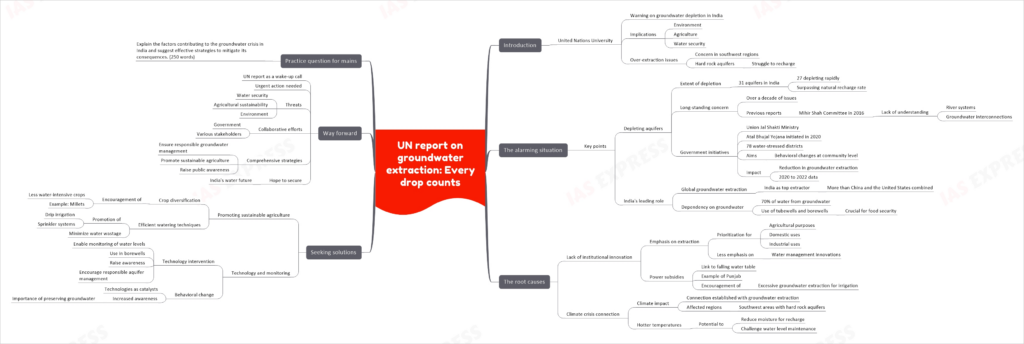UN Report on Groundwater Extraction: Every Drop Counts
This topic of “UN Report on Groundwater Extraction: Every Drop Counts” is important from the perspective of the UPSC IAS Examination, which falls under General Studies Portion.
Introduction
In recent news, the United Nations University has issued a warning regarding the critical state of groundwater depletion in India. This issue has significant implications for the environment, agriculture, and water security in the country. India has been grappling with the over-extraction of groundwater for years, and the situation has reached a point of concern, particularly in the southwest regions where hard rock aquifers are struggling to recharge. This comprehensive article delves into various aspects of the UN report on groundwater extraction in India, shedding light on the reasons behind the crisis, its consequences, and potential solutions.
The Alarming Situation
The UN report highlights the following key points regarding groundwater extraction in India:
Depleting Aquifers
- Extent of Depletion: The report reveals that out of the 31 aquifers in India, 27 are depleting at an alarming rate, surpassing their natural recharge rate.
- Long-Standing Concern: The issue of groundwater depletion has been a cause for concern for over a decade, with previous reports, including one by the Mihir Shah Committee in 2016, emphasizing the lack of understanding of river systems and groundwater interconnections.
- Government Initiatives: In response to these concerns, the Union Jal Shakti Ministry initiated the Atal Bhujal Yojana in 78 water-stressed districts in 2020, aiming to bring about behavioral changes at the community level. Data shows a reduction in groundwater extraction from 2020 to 2022, signifying the positive impact of this initiative.
India’s Leading Role
- Global Groundwater Extraction: India extracts more groundwater than any other country, surpassing the combined extraction of China and the United States.
- Dependency on Groundwater: Approximately 70% of the water used in India is sourced from groundwater, a dependency driven by the use of tubewells and borewells, which has played a crucial role in ensuring food security.
The Root Causes
Understanding the reasons behind the groundwater crisis is crucial for effective mitigation:
Lack of Institutional Innovation
- Emphasis on Extraction: India has historically prioritized the extraction of groundwater for agricultural, domestic, and industrial purposes, with less emphasis on institutional innovations in water management.
- Power Subsidies: The link between power subsidies and the falling water table in states like Punjab has been evident. Power subsidies have encouraged excessive groundwater extraction for irrigation.
Climate Crisis Connection
- Climate Impact: Researchers have established a connection between groundwater extraction and the climate crisis, particularly in regions like the southwest, where hard rock aquifers limit natural recharge.
- Hotter Temperatures: Rising temperatures could exacerbate the situation by reducing moisture available for groundwater recharge, posing a significant challenge to maintaining water levels.
Seeking Solutions
Addressing the groundwater crisis requires a multifaceted approach:
Promoting Sustainable Agriculture
- Crop Diversification: Encouraging the cultivation of less water-intensive crops like millets can help reduce the demand for groundwater in agriculture.
- Efficient Watering Techniques: Promoting efficient watering techniques, such as drip irrigation and sprinkler systems, can minimize water wastage.
Technology and Monitoring
- Technology Intervention: Implementing technologies that enable individuals to monitor water levels in their borewells can raise awareness and encourage responsible aquifer management.
- Behavioral Change: Such technologies can act as catalysts for behavioral changes, as people become more aware of the importance of preserving groundwater.
Way Forward
The UN report on groundwater extraction in India serves as a wake-up call. Urgent action is needed to address this crisis, which threatens the nation’s water security, agricultural sustainability, and the environment. The government, along with various stakeholders, must collaborate on comprehensive strategies to ensure responsible groundwater management, promote sustainable agriculture, and raise public awareness. Only through concerted efforts can India hope to secure its water future.
Practice Question for Mains
Explain the factors contributing to the groundwater crisis in India and suggest effective strategies to mitigate its consequences. (250 words)
Source: Indian Express


